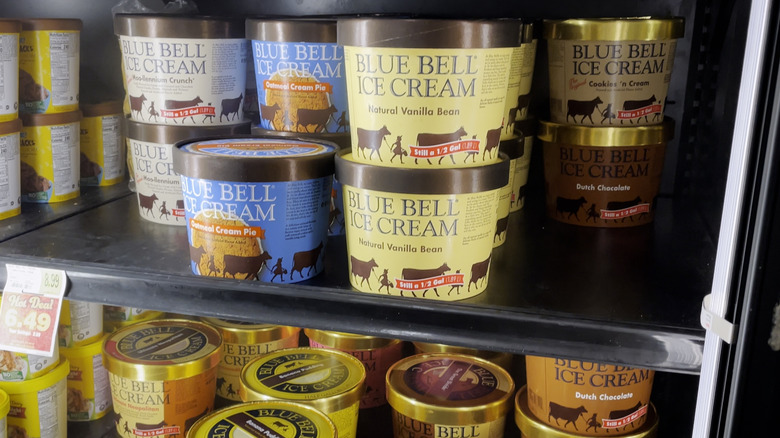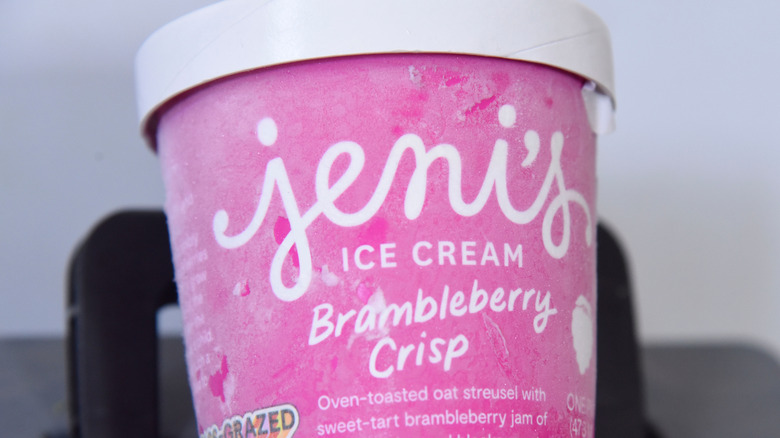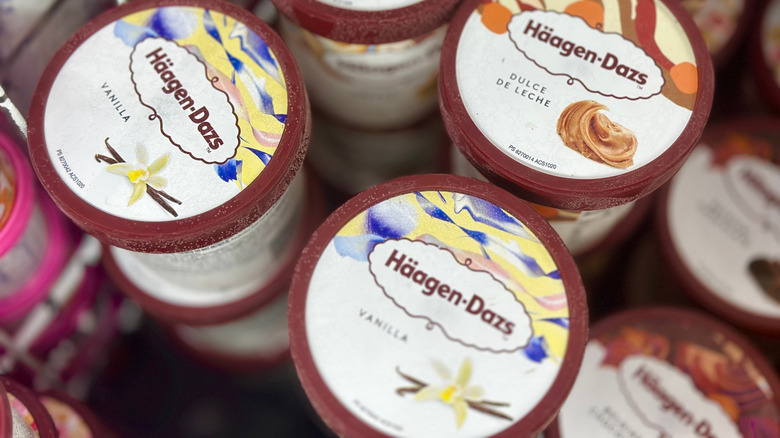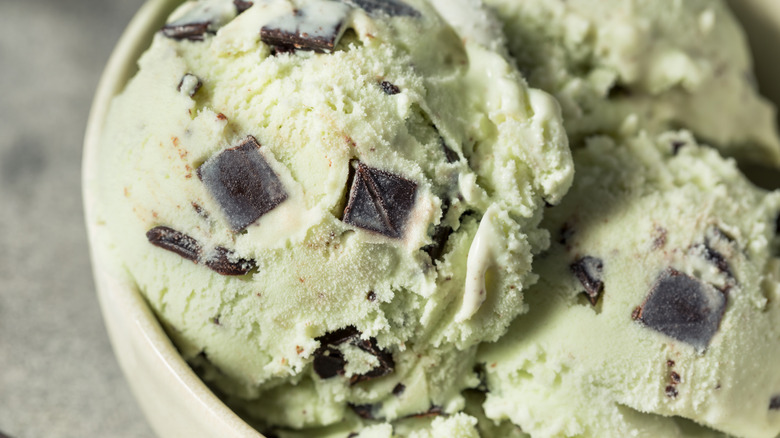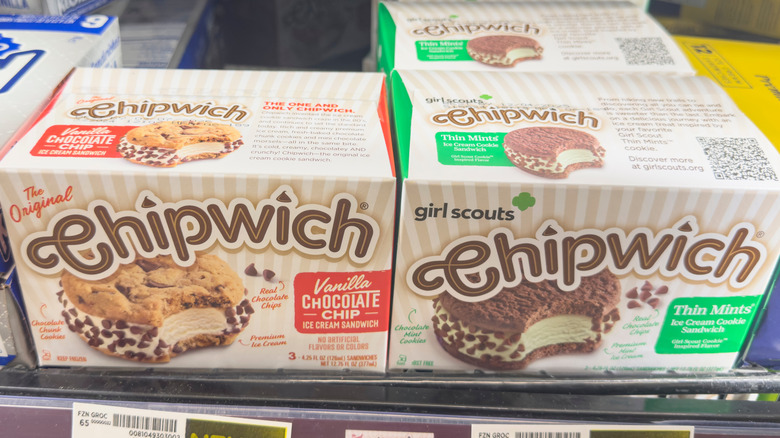Biggest Ice Cream Recalls That Plagued The Industry
Ice cream is the ultimate comfort food — smooth, cold, and seemingly always able to sweeten your day. But the very treat that brings joy can also end up doing the exact opposite. No food is immune from contamination, and even the most beloved ice cream brands have faced massive recalls. Some crises posed the risk of serious food poisoning, while others exposed people to potentially harmful objects. But all of them plagued the industry.
As the incidents played out, they damaged profits, endangered customers' health, and potentially weakened consumer trust. Moreover, they served as reminders that the world of frozen indulgence can be more complicated and perilous than we'd like to think. From Blue Bell's devastating Listeria outbreak in 2015 to Häagen-Dazs pulling vanilla ice cream off global shelves, these harrowing situations double as a lesson in how the treats that fill your freezer can become threats. Let's dig into the biggest ice cream recalls that have rocked the industry.
Blue Bell's total product recall (2015)
In April of 2015, Blue Bell Creameries issued a sweeping recall of all its products, including ice cream, sherbet, and frozen yogurt, due to potential contamination with Listeria. Notably, the Texas Department of State Health Services first notified Blue Bell of Listeria contamination in two ice cream samples that February. A third sample tested positive for the bacteria two weeks later. However, the company opted not to notify customers or recall all of the products. After the Food and Drug Administration (FDA) linked five hospitalizations in Kansas to Blue Bell ice cream in March, the company finally began issuing more limited recalls before pulling all of its products in April.
The outbreak caused 10 confirmed cases of listeriosis across Arizona, Kansas, Oklahoma, and Texas. All patients required hospitalization and tragically, three deaths occurred in Kansas. The contaminated products were traced to Blue Bell production plants in Texas and Oklahoma, and FDA inspections uncovered serious hygiene problems. The plants were in such a poor state that dirty water might have been dropping into the ice cream during production. Their ability to clean equipment with hot water was also compromised.
After the recall, Blue Bell announced a lay off of 37% of its workers — a loss of roughly 1,400 jobs. The ice cream maker also faced legal repercussions. In May 2020, the company pleaded guilty to two misdemeanor counts of distributing contaminated products. A federal court imposed a record $17.25 million criminal penalty — the largest-ever fine in a food safety case.
Jeni's total recall due to listeria (2015)
April 2015 was not a good month for ice cream. Less than one week after the Blue Bell pulled all of its products, Jeni's Splendid Ice Cream issued a total product recall nationwide due to Listeria. This came after the Nebraska Department of Agriculture took a random sample of Jeni's ice cream from a Whole Foods and detected the bacteria. Thankfully, there were no reported illnesses.
Jeni's responded by halting the sale of frozen yogurt, sorbet, and ice cream sandwiches. The company also closed its shops and didn't reopen them for nearly one month. Half a million pounds of ice cream were impacted by the recall. Jeni's eventually pinpointed the source of contamination: a pint-filling machine in its Ohio manufacturing plant.
This was not the end of Jeni's Listeria woes. The company announced in June that it had once again found the bacteria in its production facility. Fortunately, the discovery was made before the ice cream reached customers. Jeni's once again stopped production and closed its retail locations. Why this problem happened twice in such a short period is unclear, but Listeria can live in water, soil, plant matter, and the intestines of animals. So there are multiple ways for it to spread. The bacteria can also survive cold temperatures, making the contaminated ice cream salvageable. The ordeal cost Jeni's more than $2.5 million.
A global Häagen-Dazs pesticides recall (2022)
In 2022, Häagen-Dazs ice cream was recalled globally for containing the chemical, 2-Chloroethanol, a byproduct of ethylene oxide (EtO). EtO and 2-chloroethanol are toxic and heavily regulated chemicals, with varying exposure limits imposed in different countries. While EtO is still used in the U.S., several nations and the EU have banned its use in food products. The detection of 2-chloroethanol in Häagen-Dazs vanilla ice cream and mini tubs led to recalls in Ireland, France, Belgium, Indonesia, the Philippines, and New Zealand, to name only a few. The ice cream was manufactured in France and the chemical was traced to the vanilla extract supplier. Products in the U.S. were not involved in the recall because they had a separate supplier.
A known pesticide, EtO is sometimes added to products designed to kill viruses and bacteria. In food, it can be used to sterilize dried herbs and vegetables to control food-borne illnesses like Salmonella and E. coli. When deployed as a gas, it also eliminates insects. The Environmental Protection Agency (EPA) assesses the safety of the product every 15 years, and its 2020 assessment warned that long-term inhalation could cause cancer.
Canadian ice cream plastic contamination (2022)
In 2022, inedible objects caused problems in Canada, where Baskin Robbins, Best Buy, and President's Choice ice cream products were recalled in response to plastic and metal contamination. The Canadian Food Inspection Agency (CFIA) named 13 flavors, including classics like mint chocolate chip, vanilla, Rocky Road, and Pralines 'N Cream. Most of the affected products were available in 1-quart containers.
The incident was categorized under Class 2, indicating moderate risk. The recall spanned various retail locations, hotels, and restaurants and other. It's unclear how the metal and plastic made their way into the ice cream. Also involved in the incident was Agropur Coopérative, a dairy supplier headquartered in Quebec, although the extent of its role is unclear. However, Agropur faced a somewhat similar problem in the past when it recalled packs of cheese due to metal contamination. Thankfully, no injuries were reported in connection with the ice creams.
Totally Cool's listeria recall (2024)
During 2024's peak ice cream season — summer — an enormous mishap occurred. Totally Cool, a co-manufacturer of many well-known frozen treats, was responsible for one of the biggest recalls of the year. Once again, a Listeria risk was to blame. Multiple companies, including Hershey's, Jeni's, and Chipwich, had more than 60 products removed from store shelves just in case they were tainted. The items had been distributed nationwide.
Hershey's, AMAFruits, Abilyn's and other companies all sent out recall notices. In some cases, they took the step of explaining that their ice creams had not actually tested positive for Listeria, and some were even made on a separate production line. The items were pulled nevertheless as a precautionary measure. Fortunately, no illnesses were reported. Totally Cool, however, filed for bankruptcy just a couple months after the recall because it had to halt all production as ordered by the FDA.

